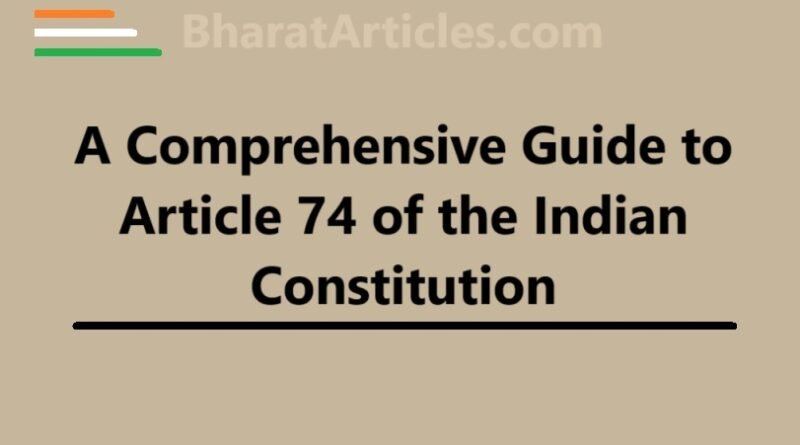A Comprehensive Guide to Article 74 of the Indian Constitution
Introduction
Article 74 of the Indian Constitution lays down the framework for the functioning of the Union executive, specifically addressing the role of the Council of Ministers in aiding and advising the President. This article ensures that the President, as the constitutional head, acts based on the advice of the Prime Minister and the Council of Ministers, thereby upholding the principles of a parliamentary democracy.
Understanding Article 74
Article 74 establishes the relationship between the President and the Council of Ministers, ensuring a system of collective responsibility in governance. The provision states:
Text of Article 74:
- There shall be a Council of Ministers with the Prime Minister at the head to aid and advise the President, who shall, in the exercise of his functions, act in accordance with such advice.
- The President may require the Council of Ministers to reconsider such advice, either generally or otherwise, but the President shall act in accordance with the advice tendered after such reconsideration.
- The advice tendered by Ministers to the President shall not be inquired into in any court.
Key Features of Article 74
- Binding Nature of Advice: The President must act based on the advice of the Council of Ministers, ensuring that real executive power rests with the elected government.
- Reconsideration Provision: The President can ask the Council of Ministers to reconsider its advice, but once it is reaffirmed, the President is bound to follow it.
- Secrecy of Advice: The courts cannot inquire into the nature or content of the advice given by the Council of Ministers to the President.
- Collective Responsibility: The Council of Ministers, headed by the Prime Minister, works as a unified body responsible for governance.
Importance of Article 74
- Preserves Parliamentary Democracy: By ensuring that executive authority is exercised based on ministerial advice, Article 74 reinforces India’s parliamentary system.
- Prevents Presidential Discretion: The provision prevents the President from acting independently, ensuring that executive power is exercised by elected representatives.
- Ensures Stability: By mandating collective decision-making, Article 74 maintains the stability of governance and policy execution.
Judicial Interpretation and Landmark Cases
Several landmark cases have shaped the interpretation of Article 74:
- Shamsher Singh v. State of Punjab (1974): The Supreme Court ruled that the President is bound by the advice of the Council of Ministers and cannot exercise discretionary power.
- S.R. Bommai v. Union of India (1994): This case reinforced the concept of collective responsibility and limited the President’s discretionary power in state matters.
- Kehar Singh v. Union of India (1989): The Court ruled that the President cannot act independently in matters of granting clemency under Article 72 and must follow the advice of the Council of Ministers.
Comparison with Related Articles
- Article 53: Vests executive power in the President but subject to Article 74.
- Article 75: Deals with the appointment of the Prime Minister and Council of Ministers.
- Article 77: Lays down the conduct of government business under the President’s name.
Conclusion
Article 74 is a cornerstone of India’s constitutional democracy, ensuring that real executive power remains with the elected government while maintaining the ceremonial authority of the President. The provision safeguards the principles of parliamentary democracy, prevents autocratic rule, and ensures that governance is conducted through collective decision-making.

